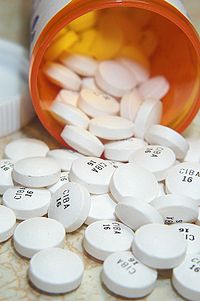stimulants
Stimulants (also called psychostimulants) are psychoactive drugs which induce temporary improvements in either mental or physical function or both. Examples of these kinds of effects may include enhanced alertness, wakefulness, and locomotion, among others. Due to their effects typically having an "up" quality to them, stimulants are also occasionally referred to as "uppers". Depressants or "downers", which decrease mental and/or physical function, are in stark contrast to stimulants and are considered to be their functional opposites. Stimulants are widely used throughout the world as prescription medicines and as illicit substances of recreational use or abuse.
Stimulants (Analeptics) produce a variety of different kinds of effects by enhancing the activity of the central and peripheral nervous systems. Common effects, which vary depending on the substance in question, may include enhanced alertness, awareness, wakefulness, endurance, productivity, and motivation, increased arousal, locomotion, heart rate, and blood pressure, and the perception of a diminished requirement for food and sleep. Many stimulants are also capable of improving mood and relieving anxiety, and some can even induce feelings of euphoria. It should be noted, however, that many of these drugs are also capable of causing anxiety, even the ones that may paradoxically reduce it to a degree at the same time. Stimulants exert their effects through a number of different pharmacological mechanisms, the most prominent of which include facilitation of nor epinephrine (noradrenaline) and/or dopamine activity (e.g., via monoamine transporter inhibition or reversal), adenosine receptor antagonism, and nicotinic acetylcholine receptor agonism.
Stimulants (Analeptics) produce a variety of different kinds of effects by enhancing the activity of the central and peripheral nervous systems. Common effects, which vary depending on the substance in question, may include enhanced alertness, awareness, wakefulness, endurance, productivity, and motivation, increased arousal, locomotion, heart rate, and blood pressure, and the perception of a diminished requirement for food and sleep. Many stimulants are also capable of improving mood and relieving anxiety, and some can even induce feelings of euphoria. It should be noted, however, that many of these drugs are also capable of causing anxiety, even the ones that may paradoxically reduce it to a degree at the same time. Stimulants exert their effects through a number of different pharmacological mechanisms, the most prominent of which include facilitation of nor epinephrine (noradrenaline) and/or dopamine activity (e.g., via monoamine transporter inhibition or reversal), adenosine receptor antagonism, and nicotinic acetylcholine receptor agonism.

